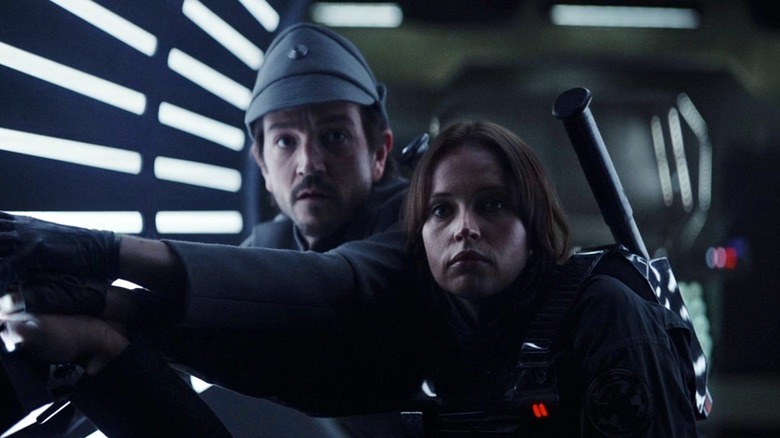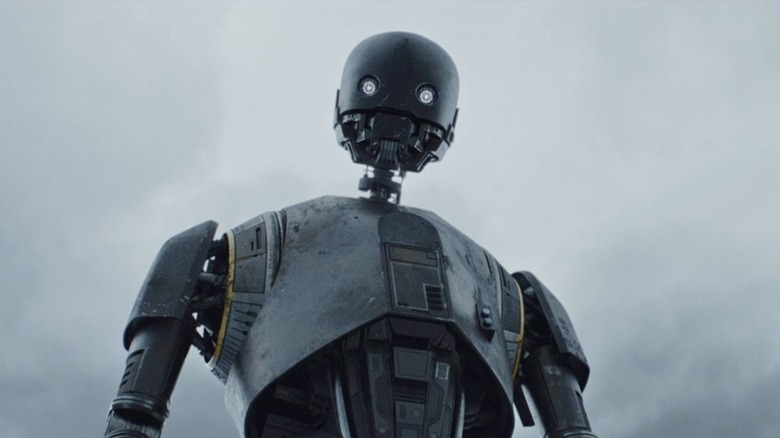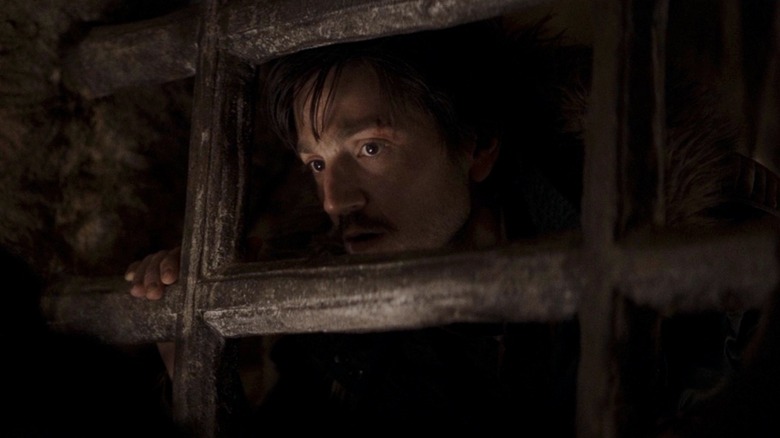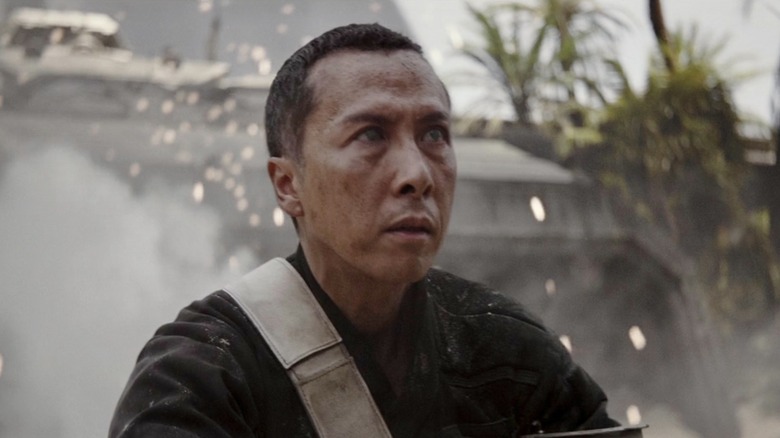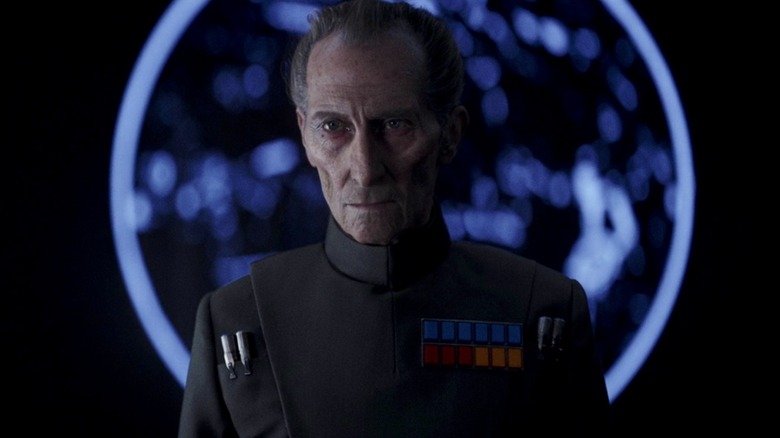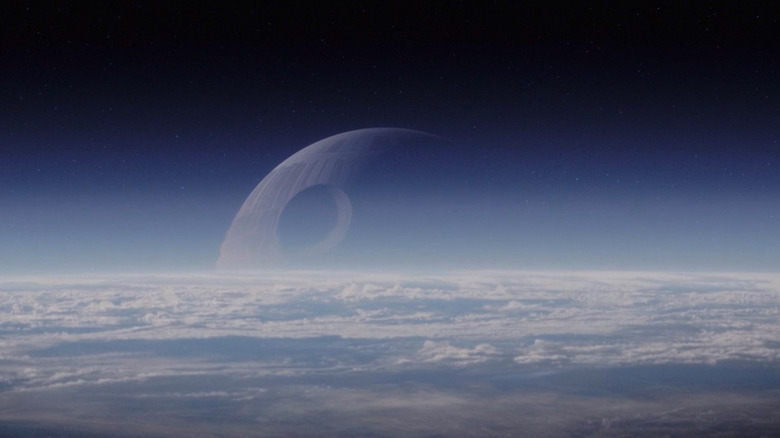The Daily Stream: Rogue One: A Star Wars Story Takes On Deeper Dimensions After Andor
(Welcome to The Daily Stream, an ongoing series in which the /Film team shares what they've been watching, why it's worth checking out, and where you can stream it.)
The Movie: "Rogue One: A Star Wars Story"
Where You Can Stream It: Disney+
The Pitch: "I'm beginning to think the Force and I have different priorities." This is a simple throwaway line that Cassian Andor (Diego Luna) utters in "Rogue One," but anyone who's spent enough time in the galaxy far, far away, may have felt the same sentiment toward Disney, Lucasfilm, or George Lucas himself, somewhere along the way.
It's only been six years since the theatrical release of "Rogue One," but already that feels like a lifetime ago. So much has happened since 2016, in both the "Star Wars" franchise and the world at large, with the highs and lows of fandom playing out with the Skywalker sequels — as they did with the prequels — and the advent of streaming services like Disney+ changing the way people consume movies and TV.
Looking back, it feels like "Rogue One" was the last time critics and audiences were really aligned in favor of a "Star Wars" film. Now, they're mostly realigned in favor of "Andor," which has shown how sophisticated a "Star Wars" TV series can be. (Sorry, younglings, but shows like "The Book of Boba Fett" and "Obi-Wan Kenobi" can't hold a candle to it.)
Yet here we are: it's Wednesday, and for the first time in months, there's no new episode of "Andor." For viewers going through withdrawals, one immediate remedy would be to rewatch "Rogue One." I found myself doing it first thing after the "Andor" season 1 finale, and having the show fresh in my mind changed my perspective on certain scenes, just as Luna said it would.
Why it's essential viewing
Though it features two Darth Vader scenes, "Rogue One" was the first "Star Wars" film (not counting old Ewok TV movies) to explore the potential for stories beyond the Skywalker saga. It begins without an opening crawl, something unheard of in the movie series up to that point. Michael Giacchino's music offers a departure from the usual John Williams score, echoing it in places while also going new directions — with his first cue for Jedha giving the Imperial-occupied moon a distinct, buzzy signature. (The place is "about to blow," and it does, just like Ferrix, after someone lobs a grenade in the street.)
Obi-Wan Kenobi's famous line, "From a certain point of view," set a precedent for moral relativism in the "Star Wars" universe, but "Rogue One" was the first movie to really take that further. It begins by showing how the scientist who designed the Death Star, Galen Erso (Mads Mikkelsen), became a hostage of the Empire before building a fatal flaw into its new "planet killer." His daughter, Jyn (Felicity Jones), likewise grows up to be a prisoner, bound for an Imperial labor camp in a transport where even the Stormtrooper guard has a dejected way of sitting. ("What now?" he groans as the transport stops.)
Rockin' a trash 'stache, this version of Cassian calls Galen "a tool of the Imperial war machine." But wars are fought on both sides, and "Rogue One" makes it clear there's a fine line between the "good guys" and bad guys, with Cassian being just as much of a tool for the Rebels. When we first meet him, he mercilessly dispatches an informant to get himself out of a jam. It's the same thing Luthen Rael (Stellan Skarsgård), was willing to do to him on "Andor."
'More than one sort of prison'
"Rogue One" excels at making the audience care about a new ragtag band of "Star Wars" characters in a relatively short amount of time. Cassian and K-2SO, mo-capped and voiced by Alan Tudyk, make for an ideal pair, as do the two former Guardians of the Whills, Chirrut (Donnie Yen) and Baze (Jiang Wen). As the rare Force-sensitive individual onscreen who's not a Jedi, Chirrut, especially, has a soulfulness to him, which he channels into his instant-classic mantra, "I'm one with the Force, the Force is with me."
The scene where Chirrut is talking to Cassian behind bars now requires the viewer to do some mental gymnastics, retconning lines the same way Lucas did (despite his insistence that he had it all planned out) back in the original trilogy when he decided to give Luke Skywalker, Darth Vader, and Princess Leia family ties (thereby altering the way we look at Luke and Leia's "Empire Strikes Back" kiss forever).
Chirrut says he and Baze have "been in worse cages than this one," and Cassian replies, "This is a first for me." The prison arc of "Andor," however, shows how he led a whole jailbreak, so we can only surmise that this is the smallest prison he's ever been in or that he's now too weary, secretive, or deceptive of a spy to correct Chirrut's assumptions about him.
Chirrut, and later, Jyn, also tease the possibility that Cassian merely traded one prison for another when he handed his life over to the Rebels and agreed to start taking orders from them, even if it meant carrying out assassinations and being no different from a rank-and-file Stormtrooper. "There is more than one sort of prison," Chirrut tells him. "I sense that you carry yours wherever you go."
What rebellions are really built on
Mon Mothma shows up in "Rogue One," played by the same actress from "Andor," Genevieve O'Reilly, and now we have added context for why Saw Gerrera (Forest Whitaker) is so paranoid and believes there are "spies everywhere." Mon mentions that Saw's grown more militant since he broke from the Rebellion, and it's all because Luthen planted the seeds of distrust in him when he showed that he was willing to sacrifice friendly forces for the greater good.
Without lightsabers or Jedi powers, these Rebels are forced to play dirty, and maybe the ends don't always justify the means. Like Vader, Saw is "more machine now than man," having evolved to become a robo-legged torturer with a telepathic octopus. (The writers of "The OA, Part II" must have been taking notes, and between Bor Gullet, cooked tentacles in the Jedha marketplace, and the rathars of "The Force Awakens," someone at Lucasfilm must have an octopus fetish).
There's a repeated line in "Rogue One" about "how rebellions are built on hope," but the movie also shows how they're built on questionable tactics. Saw inflicts the kind of psychological torture on Bodhi Rook (Riz Ahmed), an Imperial defector and potential ally with vital information, that Vader once did on Leia and that Dedra Meero (Denise Gough) does with Bix Caleen (Adria Arjona) on "Andor." It's a scary moment when Bodhi looks up from the floor, his eyelid twitching, as Saw takes a mean puff from his oxygen mask, "Blue Velvet"-style.
For her part, Jyn is in a place more like Cassian at the beginning of "Andor." She doesn't care about the Rebel cause and the Imperial flag isn't a problem for her if she doesn't look up. Political opinions, she says, are a luxury she's never had.
It's a small, small galaxy, after all
There are moments in "Rogue One" that represent the best and worst tendencies of modern "Star Wars." Not everything in the movie works. One big thing hampering it is its digital resurrection and de-aging of actors like Peter Cushing and Carrie Fisher. Grand Moff Tarkin still has that "it came from the uncanny valley" vibe, as if he just walked in out of a video game, similar to Luke Skywalker in "The Mandalorian" and "The Book of Boba Fett."
They could have gotten away with not showing Leia's face. Just the back of her white princess robes would have been enough. Suffice it to say, Lucasfilm can probably afford to give the legacy characters a rest, if the failure of "Solo: A Star Wars Story" has made it skittish about recasting them with younger actors.
"Rogue One" does have one foot stuck in the past, which is understandable given that this was only the second "Star Wars" film under Disney. So, we do get bantering Stormtroopers and cheesy cameos, like C-3PO and R2-D2, or the Cantina regulars, Dr. Evazan and Ponda Baba, who bump into Jyn and Cassian and threaten them with the same line, "You just watch yourself!"
As Vader, you can also hear the recently retired James Earl Jones straining his voice as he Force-chokes Orson Krennic (Ben Mendelsohn) and puns, "Be careful not to choke on your aspirations." The obligatory callback to the line, "I've got a bad feeling about this," is less awkward, but it's a symptom of the same errant "Rise of Skywalker" instinct, whereby misguided attempts at fan service would eventually trump good storytelling altogether.
Fortunately, "Rogue One" had Tony Gilroy, someone with a self-described "emotional detachment" to "Star Wars," to help salvage it in reshoots.
Death Star on the horizon
Gilroy has said elsewhere that he had "no reverence" for "Star Wars" prior to "Rogue One," and for a franchise that's often been undone by too much reverence on the part of both creators and fans, that may be just what was needed. When mythology becomes your religion and that matters more than the narrative at hand, it's easy to start functioning like a Sith acolyte.
Cut to the roundtable scene in "Rogue One," where — instead of an info dump about "thermal oscillators" like in "The Force Awakens" — we see bickering and infighting among members of the Rebel Alliance High Command. That happens with the Empire, too, as "Andor" shows with the Imperial Security Bureau's roundtable.
"We've all done terrible things on behalf of the Rebellion," Cassian says to Jyn toward the end of "Rogue One." With him are "spies, saboteurs, assassins," the forgotten human detritus of a history previously dominated by Jedi feats. One of them is Melshi (Duncan Pow), Cassian's fellow factory prisoner from "Andor," who volunteers for the suicide mission to Scarif and winds up being the guy to set off the initial round of explosives announcing the Rebels' presence there.
"Rogue One" has perhaps the best third act of any "Star Wars" movie. It's not the first time Cassian has donned an Imperial uniform, but this time, he gives his own life along with everyone else. What we're left with is a pyrrhic victory and a "Star Wars" film that wrings surprising emotion from the fate of characters who weren't the chosen ones. As the Death Star emerges from hyperspace and looms over the horizon, Giacchino's music lends poignance to their moment of self-sacrifice, while Jyn and Cassian find comfort in a hug at the end of the world.
